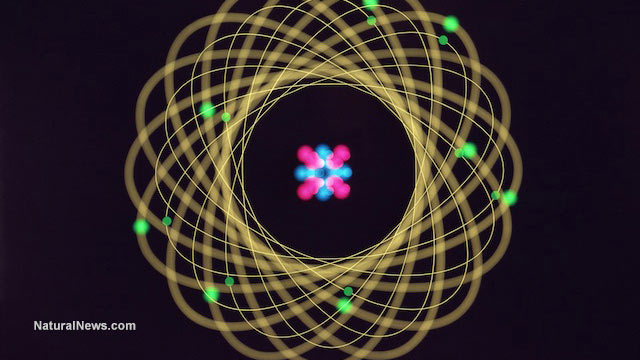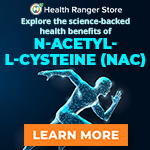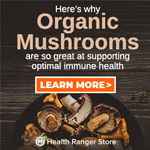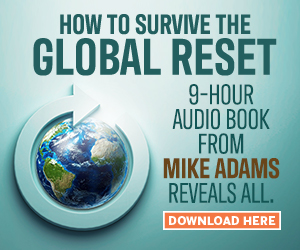The rise of citizen science: Mike Adams reveals why private citizens produce more honest science than governments or corporations
Thursday, March 17, 2016 by: S. Johnson
Tags: citizen science, government agencies, scientific integrity

(NaturalNews) You don't have to be an academic to be a scientist. Citizen science is growing globally. Communities with an amateur interest in science have helped classify galaxies, detect signs of disease, and unearth toxic metals in our food. But why is citizen science on the rise? To answer that question, no single answer will suffice.
Although there is no definitive term to describe "citizen science," simply put, citizen science includes a vast range of projects involving volunteer participation. According to the Cornell Lab of Ornithology, citizen science is "a project in which volunteers partner with scientists to answer real-world questions."
How citizen scientists first got their wings
Citizen scientists tend to lack the credentials of a university professor, but that doesn't mean becoming a citizen scientist is easy. "To be a citizen scientist, a person must possess an extraordinary ability to learn analytical techniques while possessing a solid foundation in physics, chemistry and mathematics," said Mike Adams, a pioneering citizen scientist who runs his own forensic food lab. "The search for scientific truth as an independent scientist is by no means an easy path, but it is an infinitely honorable and fulfilling one nonetheless."Although citizen science has grown in popularity in recent years, it isn't exactly new. One of the first citizen science projects involved bird watchers with the National Audubon Society. Members documented the date, time, location, environmental conditions and nesting behaviors of birds. The data collected by citizen scientists was essential in determining if a species of bird was common in a designated area, as well as if there were changes in home range or a shift in bird population.
Since the early days of bird watching, citizen science has made rapid progress. In 2015, professional citizen science organizations were created in Australia, Europe and the United States. That same year, the first Citizen Science Association Conference was held, with another scheduled for February 2017. Furthermore, in the United States, the Crowdsourcing and Citizen Science Act of 2015 was proposed to encourage federal agencies to use citizen scientists.
Holding government agencies accountable with citizen science
Government agencies need to be held accountable by citizen scientists more so than ever before, especially the Environmental Protection Agency (EPA). "As science is the search for truth, only citizen scientists who are free from the corruption and financial influence of unethical corporations have the unique qualifications to pursue that search for truth without being compromised," explained Adams.This sentiment is particularly true with respect to the EPA's handling of the Animas River. In August 2015, EPA contractors accidentally breached a dam, which flooded the Animas River with deadly toxins. The contaminants spread all the way to New Mexico, Arizona and Utah.
The EPA tried to cover up the spill, hoping that no one would notice that the river's water had taken on a mustard orange color from the toxic slew. Once the incident became manifestly apparent, the EPA intentionally underestimated the severity of the disaster. In particular, the EPA was forced to acknowledge that 3 million gallons of noxious sludge had been released into the river, which was three times greater than the initial estimates the agency provided.
It is precisely because of the chicanery tactics of the EPA and other government agencies that citizen scientists are most needed. The EPA knew that the water was contaminated, but refused to tell the public. Once the public knew, the agency fudged the numbers. If the actions of the EPA were made by an oil company, environmental activists would demand the imprisonment of the institution's CEO. Since the EPA is a government funded agency, however, a blind eye is cast at these lies and cover-ups.
Citizens with the scientific training and means can no longer passively watch as the EPA allows the children of America to be poisoned. Fortunately, this is becoming easier in wake of the cyber era. The internet has breathed new life into the citizen science community. Now, anyone with a library card and internet access has the world's best education at their fingertips. Alternative media outlets like Natural News have lifted the public's health consciousness to new heights. People want to know what goes into their food and how it is made, which requires independent citizen scientists.
The future of citizen science
The future of citizen science is bright. As technologies develop and the internet becomes more accessible, citizen scientists will be able to participate in a broader range of projects. Based on current trends, an unprecedented number of articles published in 2016 will have to acknowledge the pivotal role citizen scientists played in conducting that research.The most common field of study that citizen scientists contribute to is biology. Approximately 72 percent of all articles which citizen scientists contribute to fall within the realm of biology. Citizen science articles related to biology are being published at a faster clip than any other scientific discipline.
Critics of citizen science insist that real science cannot be conducted outside of a university. Fortunately, science is universal, meaning no one has a monopoly on its truth. "The work of citizen scientists like myself can be replicated and confirmed by any other competent laboratory in the world, if only they had any interest in doing so," Adams insists. The scientific methods and instrumentation used in Adams' lab pump out a steady stream of work that meets and beats university standards. Refusing to acknowledge scientific work just because it falls outside the towers of academia isn't just arrogant; it's anti-intellectual.
Socrates said that "the unexamined life is not worth living." For centuries, however, the examined life was a luxury reserved for the peaks of society. Fortunately, thanks to the internet, the peaks of society have come crumbling down. Citizen scientists aren't just part of the scientific community; they hold the community accountable for bias and errors. And when you think about it, isn't that what science has always been about?
Sources include:
WildLifeResearch.org
Phys.org
CSMonitor.com
NaturalNews.com
Nature.com
Study.com
Science.NaturalNews.com
Citizen science at FETCH.news
Get independent news alerts on natural cures, food lab tests, cannabis medicine, science, robotics, drones, privacy and more.
Take Action: Support Natural News by linking to this article from your website
Permalink to this article:
Embed article link: (copy HTML code below):
Reprinting this article:
Non-commercial use OK, cite NaturalNews.com with clickable link.
Follow Natural News on Facebook, Twitter, Google Plus, and Pinterest
- Newly released JFK files reveal Pentagon's role in creating Lyme disease and covid in the same lab
- Trump's greatest betrayal so far: Accelerating Middle East wars, silencing dissent, and serving Zionist masters
- The hidden dangers in your kitchen: How cooking methods impact diabetes, cancer and aging
- DEADLY DECEPTION: How COVID vaccines increased mortality rates and why authorities hid the truth
- STARDUST, a secretive Israeli-US startup, plans risky solar geoengineering experiment to BLOCK OUT THE SUN
- CDC finally halts $11 billion COVID funding scam as health officials admit the ‘pandemic’ was a fraud
- Arkansas embraces medical freedom with landmark ivermectin law
- Lab leak confirmed? Boris Johnson's stunning reversal on COVID origins sparks global debate
- Home gardening for preppers: A beginner's guide to growing your own food
- GAIN-OF-FUNCTION CAT-BIRD-FLU now on the rise as nearly a dozen cats in Colorado "test positive" for Bird Flu due to contaminated cat food
- Unraveling the paradox: Why intelligent individuals fall prey to everyday blunders
- Cartels shift tactics: Kidnappings and organ trafficking surge as border crossings plummet under Trump policies
- YouTube’s double standard: CEO defends censorship while claiming free speech champion status
- “Feel G.O.O.D. Gut Health Program” on BrightU: Why elimination diet is good for you
- “Rent-a-womb” scandal: How China is exploiting U.S. birthright citizenship for long-term espionage
- Why you should think twice before buying mainstream toothpaste formulas
- Was JFK's assassination orchestrated by a CIA double agent? New evidence points to James Angleton as the “architect”
- Record honeybee deaths devastate U.S. agriculture, pesticides under scrutiny
- Newly released JFK files reveal Pentagon's role in creating Lyme disease and covid in the same lab
- Elon Musk: Aliens could be here on Earth RIGHT NOW
- Festive flavors: The sweet history, nutritional profile and health benefits of pecan pie
- Trump reverses course on Gaza plan, says “nobody is expelling Palestinians”
- Reclaim your health: How midlife exercise reverses years of inactivity
- Big Pharma's $8 Billion bribery scheme exposed: how doctors are pushed to prescribe junk science, not heal
- Boys are back in town: Trump’s patriotic alpha crew takes the wheel while toxic females ride in the backseat
- EPA advisor admits the agency is funneling billions to climate groups ahead of Trump’s return to White House
- Space war brewing? Russia threatens to destroy Starlink satellites
- Survival 101: Effective EMF blocking techniques
- A lack of integrity in Academia: Harvard professor found GUILTY of fraudulent research to promote CRT theory
- Mike Adams Sermon 66: God will DESTROY ISRAEL for its wickedness
- 5 Simple steps to boost your brainpower: How to strengthen executive function in a distracted world
- Rep. Nancy Mace introduces bill to ban biological males from female facilities on federal property
- Sugarcane extract superior to cholesterol-lowering drugs?
- WHO focusing more on policing speech about public health and implementing global surveillance systems
- Pilots report mysterious lights 'moving at extreme speeds' across Oregon skies
- Dr. Mike Yeadon releases 15-minute testimony - WATCH - about genocidal intent of COVID “vaccines”
- EPA advisor admits the agency is funneling billions to climate groups ahead of Trump’s return to White House
- The Health Ranger releases “Vaccine Zombie” song and music video, using AI-animated zombies for the music video
- California's social media censorship law struck down: A victory for free speech or a threat to online safety?
- Dr. Mike Yeadon releases 15-minute testimony - WATCH - about genocidal intent of COVID “vaccines”
- The pandemic as a tool for INDOCTRINATION: Understanding “The Indoctrinated Brain” by Dr. Michael Nehls
- Florida takes a stand: DeSantis proposes permanent ban on mRNA vaccine mandates
- Mike Adams releases country western hit single: Goin’ Back in Time is Comin’ Home
- Mike Adams releases music poetry sensation: A Child of God
- “Why we influenced the 2020 elections”: Facebook files reveal the coordinated effort to bury the Hunter Biden laptop story
- RFK Jr. clears key hurdle: Sen. Susan Collins backs controversial HHS nominee, signaling a new era for health policy
- Unpacking the Lies That We’ve Been Fed – new song and music video released by Mike Adams, the Health Ranger
- Mike Adams releases new song and music video: Nothing More Disgusting Than a Globalist
- Newly released JFK files reveal Pentagon's role in creating Lyme disease and covid in the same lab
- Congratulations to the FULLY UNVACCINATED as you resisted the COVID-19 PROPAGANDA MACHINE fueled by over $100 BILLION
- Michigan sheriff announces criminal investigation into 2020 election crimes, Dominion Voting Systems
- Israeli soldiers accused of even more torture and abuse in the West Bank
- Migrants are taking advantage of recent hurricanes to scam residents and loot their homes
- House Intelligence Committee calls for the ARREST and PROSECUTION of Dr. Anthony Fauci
- Red Cross issues warning to stop blood plasma donations from vaccinated people
- Scientists confirm: GENIUS brain function can be spontaneously unleashed in humans without any apparent cause
- EPA advisor admits the agency is funneling billions to climate groups ahead of Trump’s return to White House
- HYSSOP: What research reveals about the health benefits of this ancient holy herb
- Two containers with completed ballots fall out of truck in Florida
- Fully vaccinated about to see “tsunami” of illness and death, warns virologist
- Global leaders unite to clamp down on “misinformation” with UN-backed Cascais Declaration
- BREAKING: 2025 NDAA authorizes mandatory military draft of WOMEN across America… as Pentagon pursues global NUCLEAR war with both Russia and China at the same time
- Michael Yon warns of a ZIONIST TAKEOVER in Trump’s second administration
- BOMBSHELL: DNA testing kits are a SCAM to develop ethnic-specific bioweapons
- Ozempic and Wegovy weight loss drugs are injectable LIZARD VENOM PEPTIDES that may unleash a devastating wave of organ failure… side effects align with symptoms of SNAKE BITES
- Israeli soldiers accused of even more torture and abuse in the West Bank
- These 13 countries just signed an agreement to engineer a global FAMINE by destroying food supply
- NASA admits that climate change occurs because of changes in Earth’s solar orbit, and NOT because of SUVs and fossil fuels
- RFK Jr. clears key hurdle: Sen. Susan Collins backs controversial HHS nominee, signaling a new era for health policy
- Sermon 30: How Jesus reveals Caesar’s FAKE CURRENCY and FALSE AUTHORITY
- Coriander seeds: Ancient medicine backed by modern science
- Arizona officials claim Maricopa County needs 10-13 days to tabulate results of the election
Science News & Studies
Medicine News and Information
Food News & Studies
Health News & Studies
Herbs News & Information
Pollution News & Studies
Cancer News & Studies
Climate News & Studies
Survival News & Information
Gear News & Information
News covering technology, stocks, hackers, and more



"Big Tech and mainstream media are constantly trying to silence the independent voices that dare to bring you the truth about toxic food ingredients, dangerous medications and the failed, fraudulent science of the profit-driven medical establishment.
Email is one of the best ways to make sure you stay informed, without the censorship of the tech giants (Google, Apple, Facebook, Twitter, YouTube, etc.). Stay informed and you'll even likely learn information that may help save your own life."
–The Health Ranger, Mike Adams












































